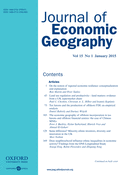-
Views
-
Cite
Cite
Ron Martin, Peter Sunley, On the notion of regional economic resilience: conceptualization and explanation, Journal of Economic Geography, Volume 15, Issue 1, January 2015, Pages 1–42, https://doi.org/10.1093/jeg/lbu015
Close - Share Icon Share
Abstract
Over the past few years a new buzzword has entered academic, political and public discourse: the notion of resilience, a term invoked to describe how an entity or system responds to shocks and disturbances. Although the concept has been used for some time in ecology and psychology, it is now invoked in diverse contexts, both as a perceived (and typically positive) attribute of an object, entity or system and, more normatively, as a desired feature that should somehow be promoted or fostered. As part of this development, the notion of resilience is rapidly becoming part of the conceptual and analytical lexicon of regional and local economic studies: there is increasing interest in the resilience of regional, local and urban economies. Further, resilience is rapidly emerging as an idea ‘whose time has come’ in policy debates: a new imperative of ‘constructing’ or ‘building’ regional and urban economic resilience is gaining currency. However, this rush to use the idea of regional and local economic resilience in policy circles has arguably run somewhat ahead of our understanding of the concept. There is still considerable ambiguity about what, precisely, is meant by the notion of regional economic resilience, about how it should be conceptualized and measured, what its determinants are, and how it links to patterns of long-run regional growth. The aim of this article is to address these and related questions on the meaning and explanation of regional economic resilience and thereby to outline the directions of a research agenda.



